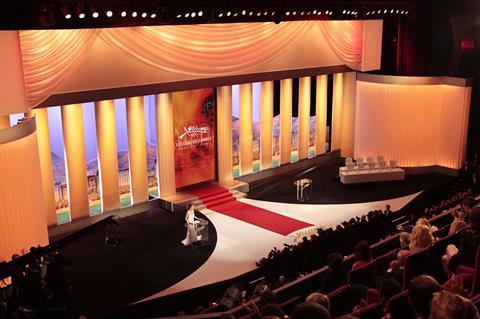Fionnuala Halligan assesses Thierry Fremaux’s decision to stop screening Cannes Competition films for press ahead of their evening world premieres.

Wouldn’t it be exciting if Cannes held simultaneous screenings for audiences and the press? Perhaps. What viewer doesn’t like “total suspense” (as Thierry Fremaux put it to French trade Le Film Francais)? But what will change, exactly?
The press will still run out to dash off a review of a complex film that took years to make, tweeting along the way. The filmmaker will still see her or his labour of love hurriedly parsed, praised or passed over within an hour of the credits.
The big difference is that the filmmaker gets her or his moment on the red carpet to proudly present their film without the slings and arrows of outrageous critics stinging their eyes. (This restlessness on the part of Cannes is said to have come after Sean Penn’s humiliating experience on The Last Face in 2016, a film Cannes should never have programmed in Competition.)
But nothing else is altered. Press already see a Competition film at 8.30am and 7.30 pm and write about it immediately after, so neither the timings nor the workload changes. And Cannes continues to stoke suspense and the media on the one hand while claiming on the other to abhor the tweetings and hurried reviews.
The question is simple: why doesn’t Cannes just impose an embargo? Every studio does it, every week, successfully. Berlin just did it, embargoing all reviews and social media until 20 minutes after the start of the first public screening and assiduously policing it. The critics love it, as we get hours to write our reviews, having seen the film that morning. The filmmakers and the films benefit, as the reviews are more measured. And there’s no scrum. (Unless you really like a scrum, while vociferously protesting that you don’t.)
We all have to remember that on one hand, lie the films. On the other, the audience. Somewhere in between – call them conduits – are festivals and the press. But the true relationship lies between the filmmaker and her or his viewers: festivals and press, what we have in common is that we’re completely peripheral players to that essential alchemy.
Cannes is a gateway, a powerful one, and so is the media, and we rely on each other – to such an extent that if Cannes imposed an embargo on reviews and social media until a stipulated time, like Berlin, it would be respected, like Berlin. Who would risk losing their pass? It’s hard enough to get one in the first place.
In Toronto, the public screenings mostly come first with the press and industry following later: tickets to the public screenings will be found for certain critics when sales are important and the clock is ticking on their reviews. Venice has followed the example of Cannes and allowed all social media and reviews to run after the first press screening, which comes before public, although every year the picture is highly confused there.
Film criticism is really a profession on the ropes and one particularly hurt by the rise of social media. Yet festivals are the one place when films are particularly vulnerable to it: if we all remember – Cannes, the press, everyone – why we are there and really believe it’s about the film and the filmmaker, then let’s do what we all can to give their creations the best shot at a considered, thoughtful review.








![The Brightest SunScreen[Courtesy HKIFF]](https://d1nslcd7m2225b.cloudfront.net/Pictures/274x183/3/5/0/1448350_thebrightestsunscreencourtesyhkiff_312678.jpg)





















No comments yet